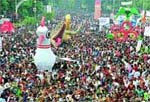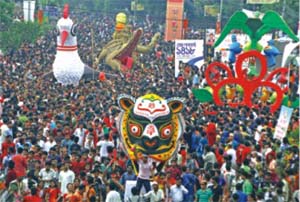The post Pahela Baishakh Celebration in Dhaka appeared first on Dhaka Mirror.
]]>Pahela Baishakh Celebration in Dhaka
 The nation welcomed ‘Pahela Baishakh’, the first day of the Bangla year 1418, on Thrusday amidst vibrant pageantry, leaving behind the gloom of the past and pledging to uphold the nation’s opulent cultural heritage.
The nation welcomed ‘Pahela Baishakh’, the first day of the Bangla year 1418, on Thrusday amidst vibrant pageantry, leaving behind the gloom of the past and pledging to uphold the nation’s opulent cultural heritage.Tens of thousands of people from all walks of life, in traditional clothes, poured into the streets, parks and open spaces across the capital and elsewhere in the country from early morning to welcome the Bangla New Year.
The tradition of celebrating the Bangla New Year — in relation to closing of the annual tax collection — started in the Mughal era. Traders and shopkeepers open ‘haal khata’ (new account books) on this day and offer sweets to clients.
In the course of time, it evolved into a day of celebration and an integral part of the Bengali culture, now considered the biggest secular festival as people irrespective of religion and class commemorate the day.
Chhayanaut, one of the leading cultural organisations of the country, has been holding their ‘barsho boron’ (New Year celebration) since 1967. On April 14, the New Year celebration at Ramna Botomul began with an instrumental recital on violin by Sheuli Bhattacharya. Sheuli played Raga Ramkeli. The melody stirred the senses as the sun slowly emerged and gleamed behind soft clouds.
Teachers, alumni and students of Chhayanaut presented solo, duet and group renditions and recitations at the event. Aside from renditions of morning raga-based songs of ‘Pancho-kobi’ (Rabindranath Tagore, Kazi Nazrul Islam, DL Roy, Atul Prasad and Rajanikant), the artistes also rendered several folk numbers on the occasion.
Secretary General of Chhayanaut, Khairul Anam Shakil, performed “Aaji Gao Mohageet”. Noted singers Mita Haque, Chandana Majumdar and Bizon Chandra Mistry rendered “Ondhojon-e Deho Aalo”, “Ke Banailo Emon Rong Mohol Khana” and “Oi Moha Sindhur Opar Thekey” respectively. A duet number, “Aaji Nutan-o Raton-e Bhushon-o Joton-e”, by Rezaul Karim and Nabanita Chakrabarti followed. “Probhat-o Beena Tabo Bajey”, “Trishit-o Akash Kanpey Re”, “Bhorer Hawaye” and more were the choruses performed by artistes.
Veteran singer Sushoma Das performed a Radharaman number while Elora Ahmed Shukla, Laisa Ahmed Lisa, Nasima Shaheen, Azizur Rahman Tuhin, Sejuti Barua and others also sang at the programme.
In her speech, President of Chhayanaut, Dr. Sanjida Khatun emphasised on fortifying our identity through ceaseless cultural practice and passion.
BTV, BTV World and Bangladesh Betar aired Chhayanaut’s ‘barsho boron’ programme live. This year Chhayanaut also celebrated its golden jubilee.
A festive spirit took over the capital and other parts of the country. Women in white saris with red borders and men in panjabi — decorated with Baishakhi motifs — ushered in the New Year.
Many had ‘panta bhat’ with fried hilsa, daal, green chilli and onion at home, restaurants and fairs. Youngsters had their cheeks painted with folk-themed emblems that added further colours to the celebration.
They thronged the main venue in Ramna. The festivities stretched over to Suhrawardy Udyan, Dhaka University and Dhanmondi Lake areas, bringing the city traffic system to a standstill. Many foreigners clad in traditional Bengali clothes were also seen in and around the venues of celebration.
The crowd turned into a human sea in the afternoon when the temperature came down slightly.
Another major attraction was the decorated procession called ‘Mongol Shobhajatra’, brought out by the students and teachers of Faculty of Fine Arts, Dhaka University. Dhaka University Vice Chancellor Professor AAMS Arefin Siddique with DU teachers and cultural personalities led the procession.
The ‘Shobhajatra’, featuring the giant replica of a crocodile (40 feet long) with three human figures riding on it, trying to kill it, symbolised wiping out the war criminals forever from Bangladesh. Replicas of two tigers also signified the embolden spirit of the nation. Thousands of people joined the procession, dancing along to the beats of dhol and other musical instruments.
There were scores of cultural shows arranged by different organisations, keeping the university area alive with heavy rush of people. It was a day of pure, unadulterated fun and merriment.
Courtesy of The Daily Star
The post Pahela Baishakh Celebration in Dhaka appeared first on Dhaka Mirror.
]]>The post Pahela Baishakh celebrated appeared first on Dhaka Mirror.
]]> The nation celebrated the Pahela Baishakh, the first day of the Bangla calendar, on Thursday amid traditional fanfare and festivity leaving behind the gloom of past and pledging to uphold the nation’s heritage.
The nation celebrated the Pahela Baishakh, the first day of the Bangla calendar, on Thursday amid traditional fanfare and festivity leaving behind the gloom of past and pledging to uphold the nation’s heritage.Tens of thousands of people from all walks of life dressed in traditional clothes poured into the streets, parks and open spaces across the capital and elsewhere in the country to welcome the year 1418.
Attired in traditional clothes, mostly sari and punjabi, they thronged venues of cultural programmes and makeshift fairs throughout the day.
Many expressed the determination to move forward with a vision to build a prosperous future through this year’s carnival of Pahela Baishakh with traditional songs, music, fanfares and colourful processions.
The day was a public holiday.
The biggest venue of the celebration was set at the Ramna Batamul, where programmes started with a Chhayanaut performance of Rabindranath Tagore’s song “Esho he Baishakh…”
Different cultural organisations and popular bands performed at the venue throughout the day as more people poured in.
The traditional colourful procession, known as Mongol Shobhajatra, organised by the students of the Institute of Fine Arts of Dhaka University, also began from its premises.
The Shobhajatra featuring giant replicas of tiger, cat, owl, tortoise, elephant and huge colourful masks symbolises triumph of good over evil. Tens of thousands of people joined the Shobhajatra dancing along the beats of traditional musical instruments.
Makeshift fairs, cultural performances and celebration programmes were organised by different organisations across the country.
Many ate traditional panta bhat (watered rice) with fried hilsa, lentil, green chilli and onion at home, restaurants and fairs.
The Central Shaheed Minar, Dhanmondi, and Jatiya Sangsad Bhaban areas were also seen swarmed with people since early morning till night.
No major untoward incidents were reported thanks to the tight security measures around the celebration venues.
Mughal Emperor Akbar introduced the tradition of celebrating the Bangla New Year in relation to closing of the annual tax collection. Traditionally, traders and shopkeepers open halkhata (new account register) on this day and serve sweetmeats to clients.
In the course of time, it evolved into a day of celebration and an integral part of the Bangalee culture. It is a non-communal festival as people irrespective of their religion, sect and creed celebrate the day as one nation.
The most visible aspect of the Pahela Baishakh was sprinkles of rural life that generally goes amiss in the everyday hustle and bustle of modern life.
The state-owned BTV, Bangladesh Betar (radio), and all private television channels broadcast special programmes and the newspapers brought out special supplements marking the day.
Various professional, political, social and cultural organisations also held programmes to celebrate the day.
Courtesy of The Daily Star
The post Pahela Baishakh celebrated appeared first on Dhaka Mirror.
]]>